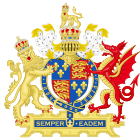| Act of Parliament | |
 | |
| Long title | An Acte for the Releife of the Poore.[2] |
|---|---|
| Citation | 43 Eliz. 1. c. 2 |
| Territorial extent | England and Wales |
| Dates | |
| Royal assent | 19 December 1601 |
| Repealed | 1967 |
| Other legislation | |
| Amended by | Statute Law Revision Act 1863 |
| Repealed by | General Rate Act 1967 |
Status: Repealed | |
The Poor Relief Act 1601[1] (43 Eliz. 1. c. 2) was an Act of the Parliament of England. The Act for the Relief of the Poor 1601, popularly known as the Elizabethan Poor Law, the "43rd Elizabeth",[a] or the "Old Poor Law",[b] was passed in 1601 and created a poor law system for England and Wales.[3]
It formalised earlier practices of poor relief distribution in England and Wales[4] and is generally considered a refinement of the Act for the Relief of the Poor 1597 that established overseers of the poor.[5] The "Old Poor Law" was not one law but a collection of laws passed between the 16th and 18th centuries. The system's administrative unit was the parish. It was not a centralised government policy[4] but a law which made individual parishes responsible for Poor Law legislation. The 1601 act saw a move away from the more obvious forms of punishing paupers under the Tudor system towards methods of "correction".
Several amending pieces of legislation can be considered part of the Old Poor Law.[6] These include:
- 1662 – Poor Relief Act 1662 (Settlement Acts)
- 1723 – Workhouse Test Act
- 1782 – Gilbert's Act
- 1795 – Speenhamland[dubious – discuss]
- ^ a b The citation of this Act by this short title was authorised by section 1 of, and Schedule 1 to, the Short Titles Act 1896. Due to the repeal of those provisions, it is now authorised by section 19(2) of the Interpretation Act 1978.
- ^ These words are printed against this Act in the second column of Schedule 1 to the Short Titles Act 1896, which is headed "Title".
- ^ "The Old Poor Law".
- ^ a b The Poor Law: overview
- ^ www.workhouses.org.uk – The Workhouse Web Site
- ^ The 1662 Settlement Act
Cite error: There are <ref group=lower-alpha> tags or {{efn}} templates on this page, but the references will not show without a {{reflist|group=lower-alpha}} template or {{notelist}} template (see the help page).
